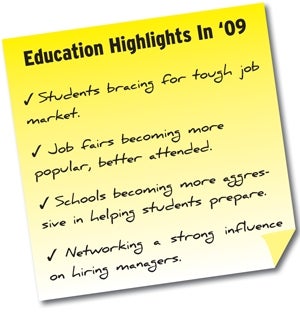Education Forecast: Schools Struggle To Prepare Grads For Tough Economy | Area schools offer tips on everything from salary negotiation to dinner etiquette
David McDonough likes to take his students at Worcester-based Clark University into a Boston job fair each fall, even though he usually has trouble filling half a bus.
But in this year’s tight job market, he had to book two.
“Our message is you want to start early because the job search is likely to take even longer,” said McDonough, Clark University’s director of career services. “That message is starting to get out there.”
McDonough is one of many local college career counselors who saw calls grow this year for their help with résumés, interviews and even dining etiquette, all before the autumn leaves changed color and the nation’s unemployment rate hit a 14-year high in October.
Demand for job services is expected to surge in 2009, as more companies follow through with their layoff plans and students struggle with longer job hunts. Counselors anticipate another rush from laid-off alumni.
Carol McGuiggan, co-director of career services at Assumption College in Worcester, misses the good old days. A survey of roughly a third of Assumption College’s Class of 2007 showed 69 percent of students found jobs within two months of graduation and 95 percent were employed within six months.
“While I’d like to be positive, and I am with the students, I do think it will take them a little more rigor to get the jobs,” McGuiggan said. “It will be interesting next year at this time to see what our survey tells us.”
Parallel Industries
McGuiggan said her first job in 2009 will be preparing students emotionally.
“We’re telling them to be realistic, not to sell themselves short, that they are receiving a great education, but that there is a lot of competition out there,” McGuiggan said.
That competition translated into a 5.3 percent unemployment rate statewide in September, 5.5 percent in October and a 5.8 percent rate in Worcester County. So far, the state’s losses have been largely in manufacturing and construction, though Worcester County has also seen its leisure and hospitality market drop off 3.2 percent in recent months.
Health care, teaching and other government jobs are expected to remain steady despite the economy. But career counselors fear other majors will be scrambling in coming months as layoffs spread from Wall Street to the automakers and other industries.
Finance majors pose a particular challenge for career counselors as they await Wall Street’s next move following President Elect Barack Obama’s inauguration and further word on how the $700 billion bailout bill will be used. At Clark University, McDonough said he will recommend finance majors look beyond the large banks.
“I think people have to be pretty broad in these types of markets,” he said. “Even if it’s not directly for finance, a student could look into finance within a company or finance within a consumer goods company.”
Marcia Eagleson, director of career services at Worcester State College, will encourage her business and finance students to look at companies in the clean energy market, which has high public support from the memory of $4 gas prices and recently passed state and federal legislation. President-Elect Obama also made advancing this industry’s work a campaign priority.
But Eagleson said finance students who are really worried may want to look even further beyond a corporate environment.
“Education, nonprofits, they all need some level of financial work,” Eagleson said.
The Network
Officials at Nichols College in Dudley will keep stressing creativity and confidence to their undergraduate and graduate business students.
“Our students are great at the job search,” said Heather Maietta, Nichols College’s director of career services. “They know where to look. They know how to prepare. They carry themselves well. They have a sense of what skills they bring to the table and they’re able to articulate that.”
Most colleges will continue offering the full range of optional professional development seminars this spring on everything from proper dress to negotiating salary and budgeting to taped mock interviews. Some also plan to add more career service instruction as part of regular classes.
Maietta said she expects the Class of 2009 to pay close attention to any instruction they receive.
“They know what’s going on,” she said. “They’re realizing they’re going to need the assistance we are going to provide them.”
But faced with a collapsing job market that shows no signs of improvement and Corporate America’s hard-to-break resume database, career counselors say their best advice may be networking.
“If I could preach this, it would be networking, really developing some contacts in your field,” said Eric Saczawa, director of career services at Becker College in Worcester. Saczawa recently began seeking out Becker College alumni to formalize a networking program he calls the Alumni Career Volunteer program.
Sally Schirmer-Smith, director of career services at Bay Path College in Longmeadow, said she will advise students to ask professors about any industry lectures and conferences they can attend.
“This is where you’re going to meet people who can help you, people who are established in your field,” Schirmer-Smith said.
McDonough said networking is a must when jobs are in high demand and is suggesting his students keep in touch with industry contacts through email and web sites like LinkedIn.com.
“Even though you kind of do the same kind of thing you’ve done before, you need people advocating on your behalf and that’s where the networking aspect in the next year will be important,” McDonough said.
Sara Withee is a freelance writer based in Millis.











0 Comments